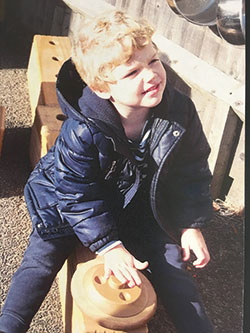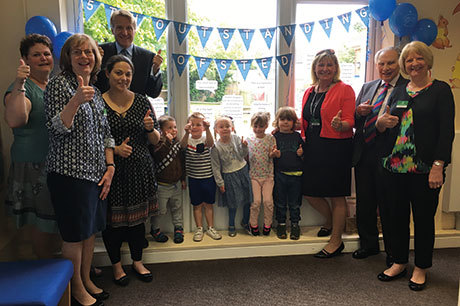
School readiness’ is as much about preparing parents for the next stage as it is their children at Rye Park Nursery School in Hoddesdon, Hertfordshire. ‘We want to engage with the parents so that when the children go to school they will also be engaged there,’ says head teacher Helen Ackerman. ‘For some parents, their most recent memories and experience of the school system is not always positive and we need to rebuild that, it’s a huge part of our work.’
‘We’re not as daunting as a primary school and the statutory framework that we follow requires us to work with parents. We are fortunate to be well-staffed, and this enables us to have the time to nurture our parents.’
Ms Ackerman has been head of Rye Park – comprised of three 20-place nursery classes and a 48-place pre-school – since January 2015 and has recently led it through its fifth Outstanding Ofsted inspection (see box). Soon after undertaking the role, she met with head teachers from the nursery’s five feeder primary schools and received feedback that they wanted the children to be more ‘school ready’.
‘Our children have a fabulous time, but we felt that we needed to raise the bar when it came to school-readiness,’ she says. ‘We wanted staff to know what expectations we had for children and also consider how we can work with families so that they understand and are ready for the school system. We wanted to embed home learning before they move on to school.’
HOME LEARNING
One of the initiatives Ms Ackerman introduced was ‘Ready Steady School’, a programme which runs for the last half of the summer term with the aim of engaging parents and helping them to understand their role in home learning. Over five weeks there is a different home learning challenge, which parents are encouraged to practise with their children. The child receives a sticker on a chart when they have completed the challenge and a certificate when they have done all five. Last year the challenges were:
- I can get dressed on my own.
- I share a book every day with a grown-up.
- I sit at the table and eat my dinner with a spoon or fork and knife.
- I can recognise my name and am beginning to recognise some of the letter shapes.
- I can recognise some familiar numbers; for example, house number or age.
The themes are changed each year depending on the cohort’s needs. ‘I am passionate about early reading and writing, so encouraging children to share a book every day with a grown-up is essential,’ Ms Ackerman says. ‘The school operates a lending scheme of core reading books, which also develops good early reading habits at home.
‘Through this, parents start school knowing that it is their responsibility to read with their child every day – it’s a bit for the children and a bit for the parents. I’ve been a Reception teacher and know that getting 30 children undressed and dressed for PE can be hectic. Also, when I was a primary school interim head I saw a real gap in children’s skills, with many children not knowing how to eat a meal with a knife and fork.
‘I want children to feel secure when they start school because they have developed the necessary skills. We want to contribute to the bigger picture further on and create confident and happy learners.’ Last year the feedback from the primary school heads was that Rye Park children had settled really well into their Reception classes.
PARENT WORKSHOPS
 Throughout the year, staff send home developmentally appropriate information on what parents can be expecting their children to do at different stages, focusing on the seven areas of learning and development in the EYFS. Ms Ackerman says the 4Children publication What to expect, when? is ‘absolutely superb’ for this. ‘There is now such a great expectation that children reach certain levels of development, and if parents don’t understand their role then they don’t know how to help,’ she explains. ‘It’s all about giving parents as much information as possible – some embrace it and some choose not to.’
Throughout the year, staff send home developmentally appropriate information on what parents can be expecting their children to do at different stages, focusing on the seven areas of learning and development in the EYFS. Ms Ackerman says the 4Children publication What to expect, when? is ‘absolutely superb’ for this. ‘There is now such a great expectation that children reach certain levels of development, and if parents don’t understand their role then they don’t know how to help,’ she explains. ‘It’s all about giving parents as much information as possible – some embrace it and some choose not to.’
The nursery school runs parent workshops, but can find it a challenge to get parents to attend. They are now considering different models, such as classroom learning sessions with parents and children together, rather than teacher-led workshops.
Ms Ackerman strongly believes that they will only get the best outcomes for children if they have the trust of their parents, which is something that all the staff work hard to gain. They pride themselves on spotting parents who may need additional support. The head or a key person will then invite them for a coffee and chat in order to signpost them to further support if needed. Parents who appear less confident in the school environment are encouraged to stay and settle their child in, look at their child’s portfolio or choose a book to share at home. The ‘thoughtful and nurturing care’ provided for children and their families was highlighted in Rye Park’s recent inspection report, and one parent told the inspector that: ‘The head teacher knows all the children personally and she looks after us all.’
Ms Ackerman says, ‘For a nursery school, the children and their families are a package – I feel that more so than in a primary school. We know the day that a baby is due to be born and the names of the toddlers. I get to know every family because I’m on the door every day and they are familiar faces. I did grapple with not having assembly or nursery school council to lead, but I see being on the door for 45 minutes in the morning and afternoon is my time with the children and parents. It’s a different, informal way of being with them and very important.’
OUTSTANDING!

Moving forward with a new leadership team after Rye Park Nursery School had already gained four Outstanding Ofsted inspections was a daunting prospect for new head teacher Helen Ackerman, who is grateful to have the support of an experienced governing body and a chair of governors who has been in post for 14 years.
‘It was important to have a strong vision of where I wanted to go. I personally had a lot to do because the last head was amazing so I needed to listen to the staff, know what changes they wanted to make and marry them into my expectations of where we wanted to go. It probably took about 15 months before we were all singing from the same hymn sheet,’ she says.
‘I didn’t have to change the teaching because I have superb practitioners who know the children well and they plan to ensure that every child makes progress.’ The two areas they decided to focus on were the structure of the day and the environment.
Structure
Ms Ackerman wanted to ‘tweak and change’ the school day in order to better tune in to the needs of the children. For example, they have a staggered start to accommodate school drop-off and some children were having to tidy up for circle time soon after they had arrived.
‘I felt the day was too much adult-directed and wanted it to be more child-initiated, so now we have two long periods of child-initiated learning so they can become absorbed in activities of their choice,’ Ms Ackerman explains. ‘I wanted to change the rhythm of the day so the children are more receptive to learning when an adult is giving direct input.’
Care is also taken not to duplicate activities for the 27 full-time children, with relaxed activities such as board games and large floor puzzles being offered to them during afternoon circle time.
Environment
They started by taking away the plastic resources in the pre-school and replacing them with natural, wooden equipment, including a mud kitchen. The KS1-sized tables and chairs were replaced with furniture appropriate for younger children.
A big home corner was created in the nursery and a large area was dedicated to block play. ‘It’s made such a difference to children’s play and learning. The data was low on children’s expressive arts and now they are being so creative with the blocks, they give a lovely stimulus,’ Ms Ackerman says. There is also block play outside and a play shed which the children transform into anything from a jail to an ice-cream shop.
Plans are now under way to develop a woodland in the nursery school grounds.
MORE INFORMATION
What to expect, when?, 4Children, www.foundationyears.org.uk/files/2015/03/4Children_ParentsGuide_2015_WEB.pdf









